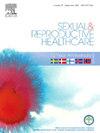The conceptualisation and evolution of psychological birth trauma in the absence of identifiable risk factors: A scoping review
IF 1.7
3区 医学
Q3 PUBLIC, ENVIRONMENTAL & OCCUPATIONAL HEALTH
引用次数: 0
Abstract
Background
Psychological birth trauma is an emerging area of childbirth research lacking a universally accepted definition. This scoping review explores how psychological birth trauma has been conceptualised in the literature, focusing on perinatal women without identifiable risk factors (e.g., physical injury, maternal morbidity risk, or prior vulnerabilities).
Objective
To understand the conceptualisation and evolution of psychological birth trauma according to the research literature, map the existing literature on psychological birth trauma, identify key elements and research gaps, and provide insights into the conceptual evolution of psychological birth trauma in the absence of identifiable risk factors.
Methods
Seven databases (MEDLINE, CINAHL, PsycInfo, Scopus, Cochrane, Informit, Emcare) were searched for published, peer-reviewed studies on psychological birth trauma without identifiable risk factors. A scoping review following Arksey and O’Malley’s framework synthesised findings from 231 articles. Data were charted to identify key elements and patterns.
Results
Five key elements central to psychological birth trauma were identified: variables of psychological trauma, long-term psychological effects, relational and social dynamics, subjective appraisals, and cultural influences. Psychological birth trauma is distinct from broader terms like “birth trauma” or “traumatic childbirth,” given its emphasis on emotional and psychological consequences.
Conclusion
Conceptual frameworks for psychological birth trauma and traumatic childbirth may guide future refinement and standardised terminology. Unique psychological dimensions are apparent in women who describe childbirth as traumatic despite lacking identifiable risk factors. This review underscores the need for multidisciplinary research to refine definitions and lays the groundwork for advancing conceptualisations and supporting women’s wellbeing in childbirth.
在没有可识别的危险因素的情况下,心理出生创伤的概念化和演变:范围审查
背景心理分娩创伤是一个新兴的分娩研究领域,缺乏一个普遍接受的定义。本综述探讨了文献中如何将心理分娩创伤概念化,重点关注没有可识别风险因素(如身体伤害、孕产妇发病风险或先前脆弱性)的围产期妇女。目的根据研究文献,了解心理出生创伤的概念和演变,梳理现有的心理出生创伤文献,识别关键因素和研究空白,为缺乏可识别的危险因素的心理出生创伤概念演变提供见解。方法检索MEDLINE、CINAHL、PsycInfo、Scopus、Cochrane、Informit、Emcare等7个数据库,检索已发表的、同行评议的无可识别危险因素的分娩心理创伤相关研究。根据Arksey和O 'Malley的框架,一项范围审查综合了231篇文章的发现。将数据绘制成图表,以确定关键要素和模式。结果确定了心理出生创伤的五个关键因素:心理创伤变量、长期心理影响、关系和社会动态、主观评价和文化影响。心理分娩创伤不同于更广泛的术语,如“分娩创伤”或“创伤性分娩”,因为它强调的是情感和心理后果。结论心理分娩创伤和外伤性分娩的概念框架可以指导未来术语的细化和标准化。尽管缺乏可识别的危险因素,但在将分娩描述为创伤性的妇女中,独特的心理维度是显而易见的。该综述强调需要进行多学科研究,以完善定义,并为推进概念化和支持妇女在分娩中的福祉奠定基础。
本文章由计算机程序翻译,如有差异,请以英文原文为准。
求助全文
约1分钟内获得全文
求助全文
来源期刊

Sexual & Reproductive Healthcare
PUBLIC, ENVIRONMENTAL & OCCUPATIONAL HEALTH-
CiteScore
2.70
自引率
5.60%
发文量
73
审稿时长
45 days
 求助内容:
求助内容: 应助结果提醒方式:
应助结果提醒方式:


